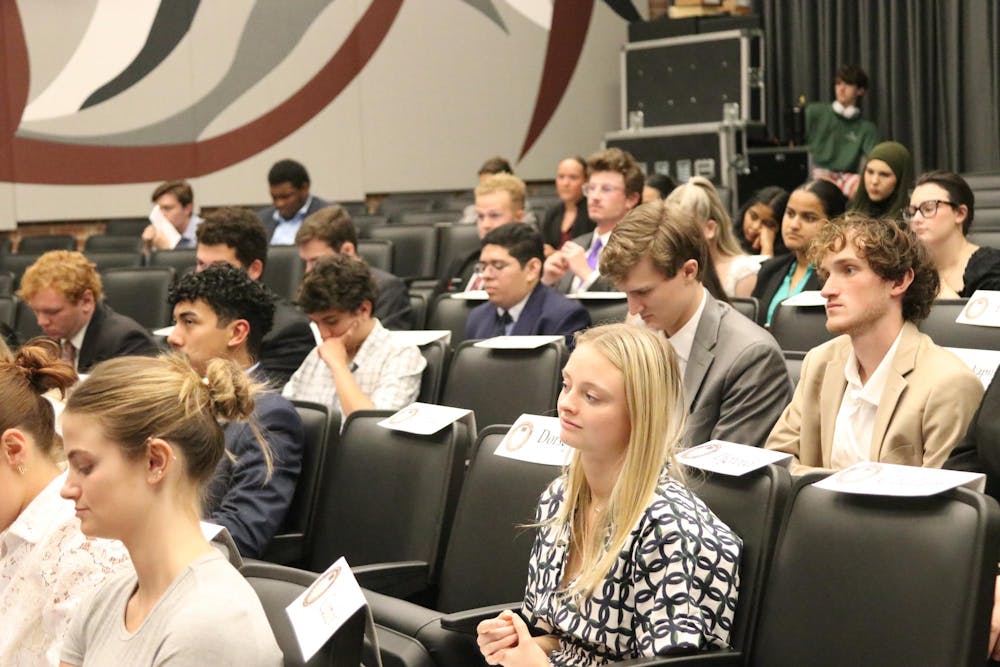USC’s student senate passed several pieces of legislation on Oct. 15, including recommendations to expand game day student wellness resources and enroll USC in the “Race to Zero Waste Gameday Basketball Challenge.”
Game day wellness resources
The senate passed a recommendation to expand game day student wellness resources. This legislation is sponsored by Vice-Chairman Cole VonCannon and Sen. Jacob Sheridan.
This recommendation aims to expand the wellness resources which Student Government already provides to students at athletic events.
These resources would be given to students in the form of “Student Section Wellness Packs,” the recommendation said. The packs would promote both student health and school spirit by including items such as water bottles and rally towels, according to the recommendation.
Sponsorships and partnerships would ensure no extra costs to students for these packs, and sponsors would provide these items in exchange for placing their logos on the products, the recommendation said.
“Our goal is for the school to not spend any money, but rather someone slap their logo on there, and then we get our resources for ourselves,” Sheridan said.
According to the recommendation, these wellness packs have received a positive response from surveyed students, with 94.8% of respondents in support of implementing them. Students also listed their preferences for items, with 86.4% having a high preference for rally towels and 83.1% wanting hand-warmers for colder games, the recommendation said.
Race to Zero Waste Challenge
The senate also passed a recommendation to enroll USC in the “Race to Zero Waste Gameday Basketball Challenge.” This legislation is also sponsored by VonCannon and Sheridan.
According to the recommendation, the Campus Race to Zero Waste program has existed since 2001, with over 1,000 schools across the United States and Canada competing in the competition.
Other South Carolina schools, such as Clemson and Coastal Carolina, are registered for the program. SEC schools such as Tennessee and Alabama are also slated to participate in 2025, the recommendation said.
VonCannon said the goal is to start the program alongside the upcoming basketball season.
USC would pick a specific game in the basketball season where food waste, recycling and trash would be tracked. The findings would then be sent to the Campus Race for Zero Waste website, and USC would be given a ranking among other schools, VonCannon said.
Participating in this event would encourage sustainable practices and enter USC into a competition which other South Carolina schools already compete in, according to the recommendation.
“If we participate in this and kind of make that first step, it kind of encourages more sustainable practices,” VonCannon said.
Departmental drop-in tutoring centers
The senate also passed a recommendation to establish departmental drop-in tutoring centers. This legislation is sponsored by Sen. Thomas Spurgeon.
According to the recommendation, the Department of Mathematics currently offers drop-in tutoring, run by graduate students, at Leconte College.
Many other academic departments, such as physics, economics, engineering and foreign languages do not offer tutoring centers, the recommendation said.
According to the recommendation, many students in other academic disciplines must rely solely on faculty office hours and peer-led supplemental instruction sessions, which may not match schedules.
“It would be helpful to have graduate students available multiple hours throughout a day so that every student has a chance to receive tutoring,” Spurgeon said.
Wall Clocks
The senate also passed a recommendation to install wall clocks in classrooms around campus. This legislation is also sponsored by Spurgeon.
According to the recommendation, many students must rely on keeping track of time by checking their phones, watches or computers during class. This is because many lecture halls at USC lack visible wall clocks, the recommendation said.
Checking the time on other devices during class can disrupt focus and give the appearance of student inattentiveness, according to the recommendation.
“It becomes a problem in classes when people pull their phones out when they don’t necessarily need to,” Spurg eon said.
Spurgeon also said during exam situations, some students may not be able to keep track of time because of a broken clock in their testing room.
Adding wall clocks and time displays to classrooms will help both teachers pace their classes and students monitor time, according to the recommendation.
Student senate will meet again on Oct. 22 at 5:30 p.m.

